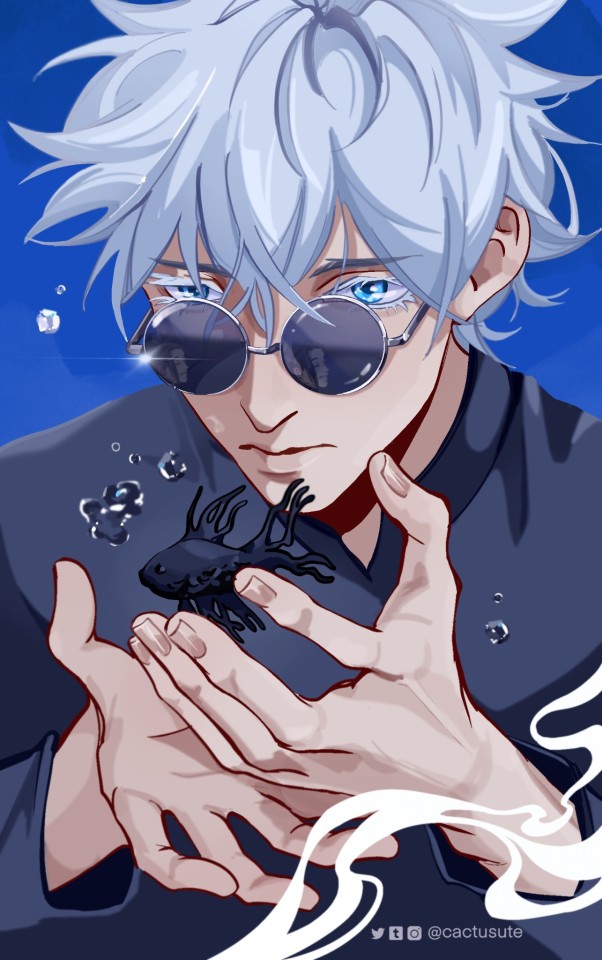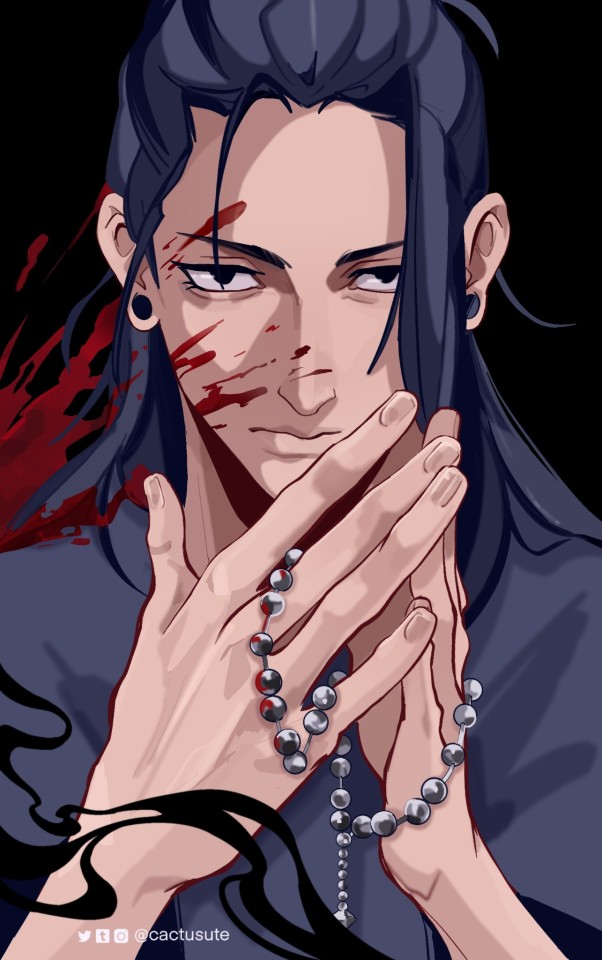Text
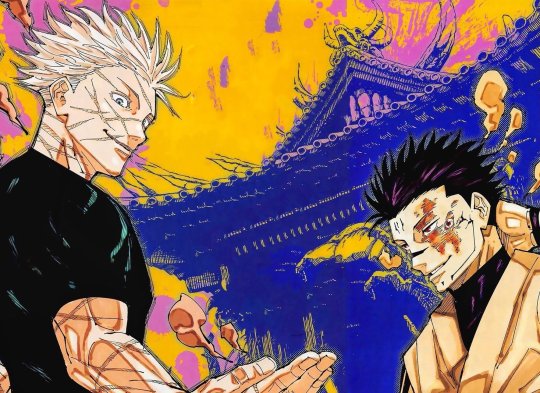
Gonna lose?! It’s Gojō Satoru!!
Karma and consequence in Jujutsu Kaisen
With the release of chapter 235 of Jujutsu Kaisen, the King of Curses has been defeated and Gojō Satoru has cemented his title as the 'Strongest’. The war isn’t over yet, but the battle is won, and I think the outcome of this fight is by far the most interesting for both characters.
Truthfully, at the start of the Shinjuku Showdown arc, I wasn’t particularly rooting for Gojō or Sukuna to win. However, as the fight developed (alongside the release of the anime adaptation of Hidden Inventory/Premature Death), I found myself becoming more and more invested in Gojō Satoru as a character and, consequently, theorising about what a ‘satisfying conclusion’ to his story might look like.
Shortly after the release of chapter 232, I saw an interesting post suggesting that ‘gain and loss’ is the theme of the Gojō vs Sukuna fight. Of course, ‘Gain and Loss’ is the title of chapter 221 when Gojō finally gets out of the Prison Realm only to learn that Sukuna has taken over Megumi’s body. I’d like to go a step further and suggest that ‘gain and loss’ — and by extension, karma and consequence — is actually a key theme of Gojō’s character (and maybe even Jujutsu Kaisen on the whole).
For full disclosure, I wrote about 90% of this before chapter 235 was released, operating on the belief that Gojō would eventually win this fight. It is a long post, so buckle up and let’s get into it!
Gain and loss in Jujutsu Kaisen
The idea of gain through loss was developed very early on in Jujutsu Kaisen with the introduction of binding vows. From Nanami’s ‘overtime’ to Sukuna's open barrier domain, a self-imposed binding vow offers a sorcerer an advantage in combat in return for an increased level of risk. In other words, sorcerers can ‘gain’ strength in exchange for a ‘loss’ of security. When it comes to binding vows, the bigger the risk the bigger the reward.
The idea of gain through loss was further developed through the introduction of Heavenly Restriction. Similar to a binding vow, a person with a Heavenly Restriction is ‘gifted’ with enhanced abilities in one area in exchange for limitations in another. However, unlike a binding vow, Heavenly Restriction exists from birth (although it remains unclear whether it occurs due to mere chance).
There are numerous powerful examples of both binding vows and Heavenly Restriction throughout the series. For Gege Akutami, they are key to maintaining a balanced power system where intelligence and tactical thinking can lead an underdog to prevail in the face of a more powerful opponent — think Yūta beating Getō or Toji beating Gojō. Through these mechanics, we can deduce that understanding gain and loss, give and take, risk and reward — however you want to put it — is crucial to mastery of jujutsu sorcery.
Naturally, if gain and loss are embedded in the laws of the Jujutsu Kaisen universe, it makes sense that the theme exerts a heavy influence over the narrative, too. Of course, consequences are an important way to create compelling characters in any story, but this rings especially true for Jujutsu Kaisen which draws deeply on Buddhist themes and traditions.
In Buddhism, karma is not a deterministic system of retribution, but the natural law of cause and effect. It is directly referenced in Jujutsu Kaisen when Fushiguro Megumi explains his personal ideology using ‘因果’, a Japanese Buddhist term meaning ‘karma’ or ‘fate’ which can be more literally translated as ‘cause and effect’. The second kanji means ‘fruit’, hinting at the underlying agricultural metaphor behind karma in Buddhism: plant a seed, later receive a harvest — or, to use a saying derived from another religion with an important role in Jujutsu Kaisen, ‘you reap what you sow’.
However, an important characteristic of karma which is commonly misunderstood is that the relationship between a cause and its effect is not necessarily linear, but rather part of an intricate network that spans past, present, and future. In other words, the ‘consequences’ of one’s actions might arrive much later.
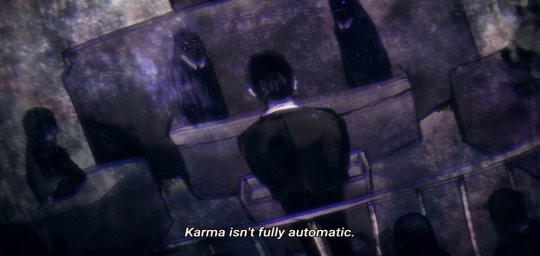
This can lead to mistaking the effect of one cause for the effect of another, creating a reality where ‘bad’ things happen to ‘good’ people and vice versa. The resulting circumstances may make it easier to do ‘bad’ deeds but, importantly, the freedom always remains to choose the path of ‘good’.
Thus emerges a system where liberation from suffering (in Buddhism, the endless cycle of rebirth known as samsara) is not determined by the judgement of some higher power, but by an individual’s continued choice to do ‘good’. In other words, you can create your own destiny, but only if you understand karma.
The beginningless karmic cycle is rooted in actions performed in ignorance. Therefore, breaking free of it — enlightenment — can only be achieved through knowledge.
Gojō Satoru: the embodiment of enlightenment
As a character, Gojō Satoru is symbolically tied to these concepts. We’re told that his birth altered the balance of the world, causing curses to grow stronger in response to the sudden injection of power into the ecosystem. However, while Gojō’s birth might be the cause of the imbalance, his very existence is itself the effect of something else.

Supposedly, the Star Plasma Vessel, the Six Eyes, and Tengen are all connected by fate. However, the term that Tengen uses — ‘因果’ — is the same one that Megumi uses for ‘karma’, suggesting a cause and effect relationship. This is confirmed when Tengen implies that the Star Plasma Vessel and the Six Eyes always appear in response to the merger — the irrepressible effect to the merger’s cause.
Kenjaku cannot contend with the immense strength of the Six Eyes nor the universal law of cause and effect. However, Fushiguro Toji, who possesses no cursed energy due to his Heavenly Restriction, is not bound by fate and is thus able to interrupt a cycle of cause and effect which has existed for at least a thousand years.
Tengen actually suggests that karma (因果) and cursed energy are one and the same so — if we take Tengen’s words at face value — Toji is an anomaly who is free from its bindings.*
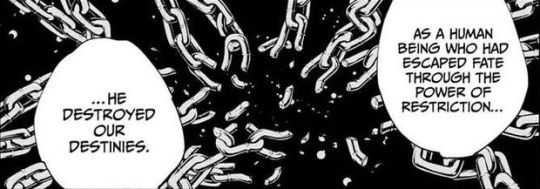
However, the characters whose lives he touches are not. Toji sets another chain of cause and effect into action when the events of Hidden Inventory lead to Gojō’s ascension to 'the Strongest'.
There is much debate in the fandom about whether Gojō’s moment of ‘enlightenment’ is legitimate, especially in light of his fight with Sukuna — the only other character associated with the phrase supposedly uttered by Buddha Shakyamuni at birth.
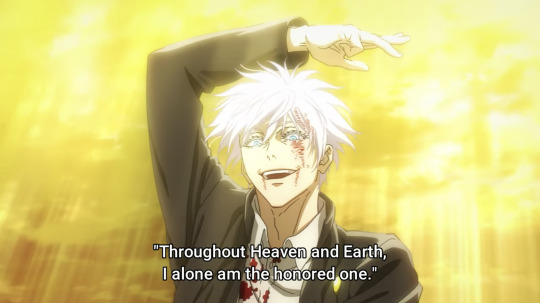
However, if enlightenment is understanding of reality that transcends conceptual thought, then Gojō Satoru is its physical embodiment in Jujutsu Kaisen.
His given name, Satoru (���), is a verb meaning ‘to know’ or ‘to understand’, and the root of the Japanese Buddhist term for ‘enlightenment’. His innate domain — a representation of one’s innermost self — is a flood of infinite knowledge that constitutes the ‘truth’ of the universe. His Six Eyes are reminiscent of the all-seeing Eyes of Buddha or the Six Transcendental Powers or the Five Eyes — or perhaps all three!
Gojō is steeped in symbolism not only relating to Buddhist enlightenment, but to the founding Buddha himself, right down to his world-altering birth — the divine event which sets the modern-day story in motion.
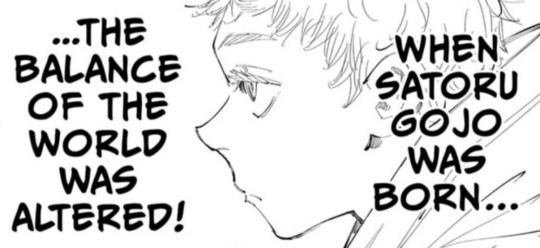
Although he may have spoken Buddha Shakyamuni’s words in a moment of euphoria, the suggestion Gojō had reached a higher state of being was never intended to be called into doubt. The pertinent question, instead, is why the unimaginable strength that accompanies his ascension to almost godlike status seems to bring Gojō more loss than gain — especially when, in a twist of irony, he was only able to gain that strength through loss.
‘The Strongest’ : an allegory for enlightenment
As the two strongest sorcerers battled it out in Shinjuku, the question on everyone’s lips during the weekly chapter discussions was, ‘Who will win?’ However, Jujutsu Kaisen has already established that ‘winner’ is not necessarily always interchangeable with ‘strongest’. Perhaps that’s why, in the aftermath of the fight, the discussion has turned to arguments about which character is the strongest instead — from cursed technique to battle IQ.
Even now, we don’t know much about Sukuna’s abilities nor his character, so it’s always been difficult to accurately judge his strength against Gojō’s. However, a surprising number of people went into this fight believing that Sukuna would win without much trouble.
Some made the reasonable argument that ‘the strongest sorcerer in history’ using the Ten Shadows technique while inhabiting the body of his dearest student presented a no-win situation for Gojō. Others made the much less reasonable argument that Gojō’s claims about his strength were little more than arrogance born from a cushy life in an era of ‘weak’ sorcerers.
Indeed, Sukuna himself echoes that sentiment in chapter 230, going as far as to call Gojō ‘unenlightened’ (凡夫) — before being immediately humbled.
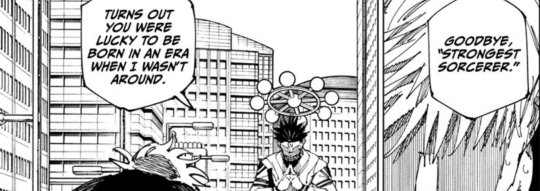
This isn’t the first time that Gege Akutami has directly challenged readers’ assumptions through his characters. However, Gojō in particular lends himself to reader speculation, because Akutami deliberately makes it difficult to know the character by maintaining a narrative distance from him that mirrors his Limitless technique.
This leads to a wonderful phenomenon where the reader falls into the same trap as the characters in the series by assuming that, while other sorcerers are struggling dreadfully, Gojō is having an easy time of things — because that’s what it looks like most of the time. Nanami might be right when he suggests that Gojō could take care of everything by himself. However, just because he could do it, does that mean he should?
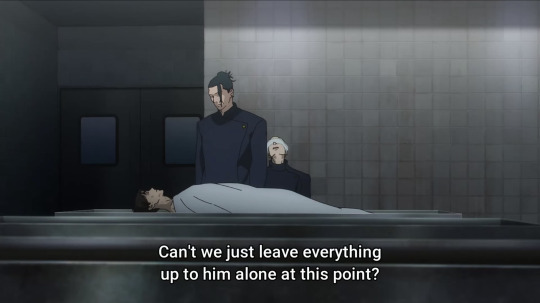
The problem is, with Gojō kept at a distance, it’s easy to forget how he became 'the Strongest’ in the first place. It’s true that, even before he becomes a fully realised Six Eyes user, Gojō’s abilities dwarfed those of any other living sorcerer. For people like Getō and Megumi whose techniques require a very steep learning curve to master, I can imagine that it feels like Gojō’s unimaginable strength was handed to him on a silver platter at times.
However, both things can be true: Gojō was born with innate strength that most sorcerers can only dream of and Gojō is an exceptional talent in his own right.
We all saw the suffering and sacrifice that Gojō went through on his path to becoming a sorcerer strong enough to face the King of Curses. In a series where the primary power source is born from negative emotions, perhaps it makes sense that tragedy promotes strength. Yet, Getō — whose technique is the epitome of strength through negative emotions — experienced the same tragedy as Gojō. So why did they head in opposite directions after the events of Hidden Inventory?
If Gojō is the embodiment of enlightenment in Jujutsu Kaisen, then Getō is his opposite. Where Gojō achieves understanding, Getō is blinded by ignorance which shackles him to a cycle of suffering — the marathon game of jujutsu sorcery.
In blaming non-sorcerers’ inability to regulate cursed energy — rather than the negative emotions that generate cursed energy in the first place — Getō mistakes one cause for another. Following the natural law of cause and effect that is karma, the solution should lie in shedding negative emotions altogether — just like Gojō at the moment of enlightenment.

Sadly, in his quest to find liberation from suffering, Getō actually condemns himself to it. Where Gojō chooses to let go of hatred and anger, Getō chooses to cling to them. This is ultimately why 'the Strongest’ changes from plural to singular. However, all of this assumes that Gojō did things the ‘right’ way when it’s very possible that Gege Akutami actually seeks to criticise a religious doctrine that separates the ‘honoured’ ones from everyone else.
Getō’s response to the horrors he endured evokes sympathy because it feels fundamentally human. In contrast, enlightenment seems so unattainable to the average human being that it becomes almost inhuman — the reserve of gods.
Indeed, Gojō is often accused of having a ‘god complex’, and Gege Akutami’s continued references to the divine don’t do anything to help. However, the series more often paints its strongest characters as closer to weapons of mass destruction or natural disasters, making the reality of ‘the Strongest’ less like reverence and more like dehumanisation.
Although Gojō achieved ‘enlightenment’, he’s ultimately still a human being — something that’s easy to forget. In fact, one of my favourite things about Gojō’s character is how he exists on an almost metatextual level. Too often, characters and readers view Gojō Satoru as 'the Strongest’ first and a human being second — a notion embodied by this notorious panel.
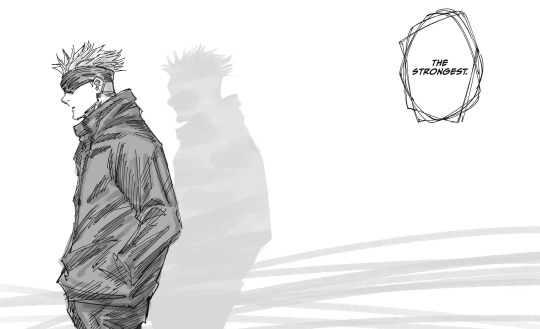
Thus, rather than having a ‘god complex’, I interpret Gojō as a character who struggles with his place in the world. His strength is what keeps him at a distance from the people around him — from the literal distance maintained by his technique to the metaphorical distance that separates him from the ‘unenlightened’.
Even the blindfold he wears to avoid discomfort hides his eyes, shutting off the ‘window to the soul’ and making him a less approachable figure. Thus, the thing that makes Gojō more comfortable around other human beings is ironically the thing that makes others less comfortable around him.
With the power at his disposal, Gojō is frightening at times, and Gege Akutami goes to great pains to show us the brutal potential of such strength — for example, in Shibuya when he ruthlessly dismantles 1000 transfigured humans with the precision of a machine in less than five minutes.
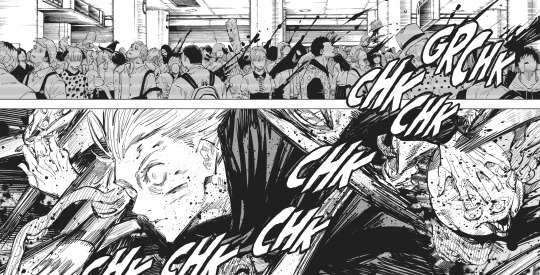
However, this display of violence comes off the back of Gojō’s most compassionate moment in which he bends the laws of jujutsu sorcery to preserve as many human lives as possible. Each time the curses attempt to force his hand, he does the inconceivable, even going so far as to limit his own strength by fighting without his technique to avoid collateral damage to humans caught up in the chaos.
Importantly, he doesn’t agonise over his decisions like the curses expect. Instead, when presented with a choice between two options that fundamentally violate his ideals, he forces another path without thinking. This is Gojō’s ‘overwhelming sense of self’. His commitment to upholding the ‘meaning’ he inherited from Getō is so unshakeable that it’s instinctive; so engrained that it’s unconscious.
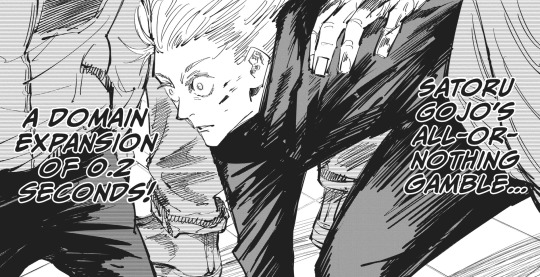
Despite his inhuman strength, Gojō’s actions in Shibuya exemplify his firm stance on the side of ordinary human beings. From his technique to his blindfold, he removes the physical barriers that separate him from the rest of humanity. The result is that, although his display of power in Shibuya is godlike, Gojō never seems more human.
Of course, it’s his humanity that ultimately makes him vulnerable to the Prison Realm, and many suggested that this ’weakness’ is why he would lose to Sukuna — a character who has wholly relinquished his humanity.
Humanity in opposition to strength
The unexpected appearance of his ‘best friend’ in Shibuya causes Gojō to falter for a heartbeat, but it’s long enough to make his brilliance look like foolishness in hindsight. His decision to save innocent people at B5F ultimately leads to the deaths of many thousands more over the course of October 31st and the following Culling Game. Among the casualties of the chaos are some of Gojō’s friends, colleagues, and students — as well as the Fushiguro siblings who were under Gojō’s personal care.
Of the Hidden Inventory arc, Nakamura Yūichi, Gojō’s voice actor said:
‘Even though Gojō had power, he failed his mission, he failed to protect Amanai, and he lost his best friend. He lost everything, and the only thing he succeeded at was awakening his abilities.’
So, it certainly seems true that Gojō’s choice to hold onto his humanity has brought him more losses than wins. In fact, at this point in the story, can we honestly say that Gojō has ever truly ‘won’?
Despite this, the characters in the series never stop thinking of Gojō as ‘the Strongest’. The narrative doesn’t ridicule him for his sentimentality in Shibuya, because it’s perfectly reasonable in the face of Kenjaku’s mind-boggling scheme. Even Sukuna recognises Gojō’s strength in the immediate aftermath of the event.
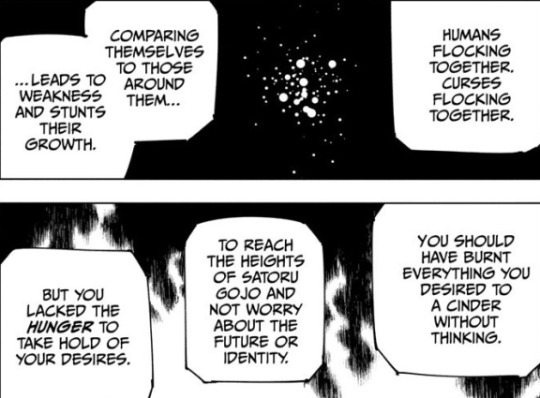
Aside from Kenjaku themselves — who has never suggested that Gojō is anything but immensely powerful — no one has ever criticised Gojō for his humanity. In fact, even prior to the Shinjuku Showdown arc, I’m not convinced that humanity is ever reliably situated in opposition to strength in Jujutsu Kaisen.
Many point to Uro Takako’s conversation with Okkotsu Yūta as evidence that tossing out one’s humanity is the only way to achieve ultimate strength. However, putting aside the fact that the translation warps Uro’s meaning somewhat, it’s unwise to assume that Sukuna’s is the only way to reach that level, simply because he’s the only example in history of a sorcerer with comparable strength to Gojō.
This is even more true when you take into consideration that everything about the context surrounding Uro’s assertion suggests otherwise. After all, this prideful, vicious sorcerer has just been beaten by a teenage boy who fights solely to protect the people he cares about.
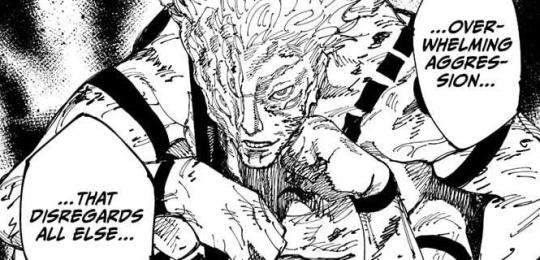
‘Overwhelming sense of self’ — the more accurate translation of the above panel — is about having absolute conviction in who you are as a person. The quality of your ideals is irrelevant as long as your commitment to them surpasses all else, and this has never been Gojō’s issue.
To say that Gojō’s humanity makes him weak misses the point, because it’s never been a question of strength. There’s no need to invent a weakness in the form of his humanity, because we already know his weakness — he told us himself.

Perhaps this starts to get at the the truth of ’the Strongest’ and the solitude that comes with ultimate strength. In Gojō’s own words, ‘When granted everything, you can't do anything.’ Despite being strong, he simply cannot save everyone. So, if being ‘the Strongest’ doesn’t help Gojō towards his goals, then what’s the point in his strength?
Of course, this is why Getō’s parting words hit Gojō so hard. When the boy who taught him that ‘protecting the weak’ is important tells Gojō that he has the power to commit the biggest act of genocide in history, the title of 'the Strongest’ is transformed from a blessing into a curse. I can’t imagine that Gojō ever feels more powerless than when he realises that he’s trying to save people using a body that’s built to destroy — a contradiction that’s illustrated to us in our first introduction (chronologically) to Gojō as a character.

If that wasn’t enough to cause an existential crisis for Gojō, Getō’s follow-up question guarantees it. In challenging Gojō’s assertion that Getō’s goals are impossible to achieve, Getō simultaneously questions Gojō’s identity beyond ‘the Strongest’, unintentionally (or perhaps intentionally) dehumanising Gojō by reducing him to his strength. This is especially painful coming from Getō of all people.
By the end of the conversation, Gojō’s entire worldview has been called into question by the person he trusted most. Getō, who always impressed upon Gojō the importance of meaning, leaves Gojō searching for the meaning in his strength — and, over 200 chapters after Getō asked the question, the answer still isn’t clear. This, I believe, is where the Shinjuku Showdown arc comes into play.
A reason to fight
From a narrative point of view, Getō isn’t entirely wrong to insinuate that Gojō lacks an identity beyond ‘the Strongest’. His primary role in the story has always been to act as a power ceiling from which the reader can extrapolate information about Gege Akutami’s world and its mechanics. Even his absence from the story is meticulously set up to illustrate the anarchy that breaks out due to the power vacuum he leaves behind.
Prior to the Shibuya Incident, Gojō Satoru’s overwhelming strength presented an obstacle to other characters’ growth. In order to create a more balanced playing field and an opportunity to explore creative techniques and fights on a previously unseen scale, it’s understandable that Akutami needed to get Gojō out of the way — at least until Sukuna could join the story as a fixed member of the cast.
As expected, even the strongest sorcerers we encountered during the Culling Game pale in comparison to the prowess on display during the Shinjuku Showdown. It all serves to show that Gojō and Sukuna are on an entirely different level — to the point that, even after Gojō burns out the part of his brain responsible for his domain, his strength still doesn’t dip below that of Okkotsu Yūta and Hakari Kinji.

To paraphrase Megumi, I shouldn’t try to find logic in a powerscaler’s behavioural patterns, but I can’t deny it’s immensely frustrating that week after week fans get caught up in arguments about who is the better sorcerer when it’s the least interesting thing about this fight.
The only reason ’the Strongest’ even existed as a neatly defined category up until this point was because of the lack of any viable opponent for Gojō. Now that he’s fighting someone on his level, comparing these two behemoths of jujutsu sorcery is the same as any other powerscaling exercise: reductive, vulnerable to bias, and ultimately missing the point.
Gege Akutami has never written a fight simply for the fun of seeing two characters go at it. There’s been a greater purpose behind every carefully created match-up in the series, either in the form of high stakes or an important lesson for the characters involved — or sometimes both.
While Akutami clearly enjoyed writing this back and forth between two masters of their craft, carefully balancing the scales to ensure that neither gained the upper-hand for too long, there is a great deal of character development staked on the outcome of this fight.
There are parallels between Gojō and Sukuna as characters but, more than anything, the Shinjuku Showdown arc has exposed some fundamental differences between the two — namely, why they fight in the first place. While it’s true that Gojō is fighting Sukuna partly because there’s no one else who can, it’s also true that the stakes have never been higher for Gojō. He has a lot to gain and a whole lot more to lose, so his reason for fighting feels tangible to the reader.
Conversely, Sukuna’s reason for fighting is considerably less clear. While we don’t know the nature of Sukuna’s binding vow with Kenjaku — or anything about his motivations in general — it doesn’t seem like there’s much at stake for Sukuna except for, perhaps, his pride. Beyond advancing the plot, this poses a lot of interesting questions about what Sukuna would have to gain from winning this fight.
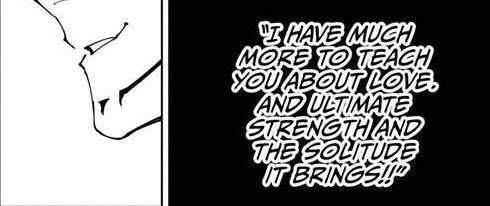
Since Gojō’s return, Sukuna has recalled Yorozu’s words about love multiple times. Their purpose — and Sukuna’s initial reaction to them — are still shrouded in mystery. However, through Gojō, we can learn something about ‘love’ and how it relates to the ‘the solitude of ultimate strength’.
Gojō never wanted to be ‘the Strongest’ alone. In fact, his entire motivation as a character is raising up ‘strong and intelligent allies’, constantly chasing the companionship he felt as one half of the strongest duo and trying to ensure that his students never feel the same isolation that’s plagued him and Getō before him.
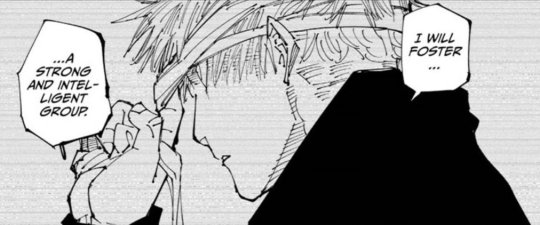
In the recent chapters of the manga, Gege Akutami has made it clear that Gojō isn’t really alone at all — Shōko reminiscing on their friendship in chapter 220; Gojō’s comrades rallying around him during the send off in chapter 222; the wonderful ‘my students are watching’ callback in chapter 230.
What’s more, for the first time in his adult life, we see Gojō — who’s famously in his element when he’s alone — start a fight with people at his side, leaning on three characters who we’ve previously been led to believe he looked down on.
The distance that’s always existed between Gojō and the people around him is closing. He has removed his mask and he is open to the world — the blindfold is gone; the shapeless, oversized jacket is gone; Gojō even removes his technique to let people in during his sendoff. Akutami makes it explicitly clear that Gojō’s allies have got his back, and he’s got theirs in turn — they’re his reason for fighting.

On the other hand, his opponent only has a single ally in all the world and, although Uraume is a devoted servant, there is no suggestion that they would tag in when the going gets tough. Sukuna has already told us that, for him, losing and dying are the same thing — a curious contrast to Gojō who does not put ‘winning’ and ‘dying’ in opposition, and this creates an interesting situation where both fighters could ‘win’ by their standards.
If Gojō saves the people he cares about (and the world at large) but dies in the process, he wins. Equally, if Sukuna is the sole survivor of the fight, he wins — but what would that actually mean for him?
One approach embodies overwhelming selfishness, the other embodies overwhelming selflessness, but only one of these approaches has been established as the most powerful form of binding vow in Jujutsu Kaisen. With all that said, many people believed that Gojō dying to win was the most likely conclusion to the fight — but that’s what a small fry would think!
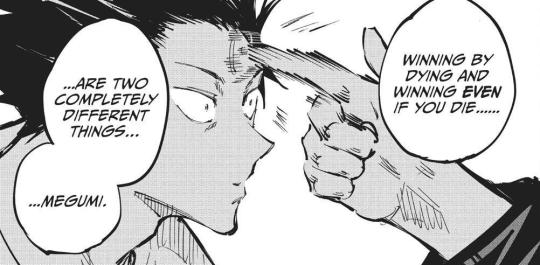
In Jujutsu Kaisen, it has always come down to one question: how much are you willing to risk — not sacrifice — in order to win? This is the lesson that Gojō impresses upon Megumi, and it’s why I was always in the camp that believed Gojō would win and survive. I didn’t expect his victory to be quite so clear cut, but it seems obvious in hindsight — and it’s all thanks to the power of love and friendship.
In chapter 234, Kusakabe suggests that Sukuna is keeping something in reserve, because he knows that if Gojō loses, he’ll immediately have to fight a number of other powerful sorcerers. Gojō knows that there are strong allies ready to back him up if he fails, so he can go all out.
Meanwhile, Sukuna is truly alone — to the point that he has to create allies in the form of shikigami in order to contend with Gojō. In the end, the explanation for Gojō’s victory is simple. Where Gojō gave it his best, Sukuna didn’t — and that was a grave underestimation of his opponent for which he paid the price.
So, the Shinjuku Showdown arc has come to an end and Gojō has reaffirmed that he is, in fact, 'the Strongest'. However, his story isn’t over yet, so what would a satisfying conclusion to his character arc look like?
Are you Gojō Satoru because you’re the Strongest?
Although Itadori Yūji is the main character of the series, Gojō Satoru is foundational to the story — despite how much Gege Akutami jokes about hating him. Gojō’s story is the thread that ties the series together, so landing the ending is crucial for completing not only Gojō’s character arc, but also that of many other characters. For Gojō, everything consistently comes back to Getō Suguru and Fushiguro Toji, but there remain unanswered questions regarding both.
Toji’s presence during the clash of the strongest sorcerers is too large to ignore. Aside from the allusions to Toji himself, his son plays a pivotal role in Gojō’s story as the human representation of gain through loss — the blessing born from Gojō’s curse. Taking Megumi under his wing marked Gojō’s first step towards a brighter future after the tragedy brought on by the failed Star Plasma Vessel mission, but there’s one major plot thread left unresolved.
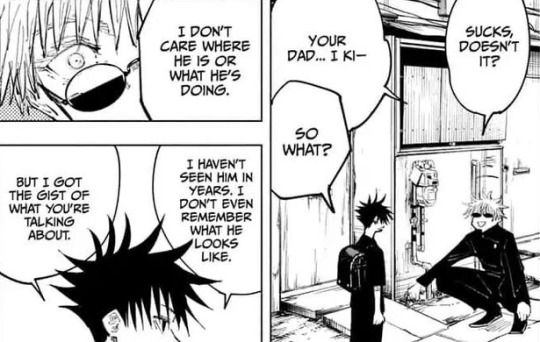
I wouldn’t have thought that Megumi learning the truth about his father was important after he dismisses Gojō’s attempt to tell him during the Hidden Inventory arc. However, the combination of Megumi’s interaction with Toji in Shibuya, his visible cluelessness when Tengen mentions Toji, and the numerous ways Gojō references Toji during the Shinjuku Showdown arc has convinced me that Akutami plans to follow this up at some point.
Right now, Megumi’s fate is still hanging in the balance. Although many people are waiting for something terrible to befall Gojō — losing his Six Eyes; burning out his technique permanently; dying — I’d like to believe that, if we look at Jujutsu Kaisen through a karmic lens, Gojō isn’t owed any more losses. At the very least, he certainly doesn’t have to die to progress the story as some people have suggested.
Our heroes, including Gojō himself, have been on a major losing streak for a long time now. Gojō being freed from the Prison Realm represented a shining beacon of hope at the lowest point in the series. To extinguish that light by killing Gojō almost immediately after he’s returned to the story would be another major blow to the characters and the readers.
I wouldn’t put it past Akutami to send some more pain our way before the end of the story, but if Gojō is going to die on December 24, I don’t think it’s before a number of other things happen.
If Gojō inherited Getō’s ideals in a symbolic ‘passing of the torch’, then his death before he has confirmed the safety of the people who depend on him is a depressing end to his best friend’s legacy. Additionally, up until now, Gojō has never had the opportunity to answer Getō’s question once and for all.
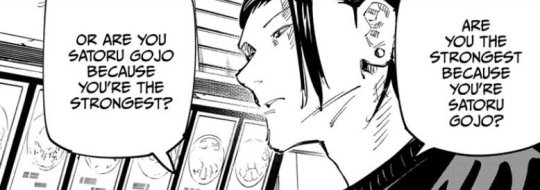
I would argue that Gojō has proven multiple times during the fight against Sukuna that he’s 'the Strongest' because he’s Gojō Satoru, but is he Gojō Satoru because he’s the strongest? He can’t discover that unless he experiences what it’s like not to be 'the Strongest' — either by losing his strength or by sharing the burden with the strong and intelligent allies he’s been raising for the entirety of his adult life.
Of course, there’s one more glaring thread to tie up, and it might be the most important of all when it comes to the completion of Gojō’s character arc. His first thought when he bursts out of the Prison Realm is a desire to lay Getō’s body to rest — a desire to rectify the mistake which threw the entire world into chaos.
As we’ve already discussed, despite his strength, Gojō has racked up a collection of costly failures. Thus, his entire character arc is about learning from the mistakes of his past. He’s taken every cruel loss that the universe has sent his way and, instead of lashing out with all that power at his disposal, he has grown from his experiences and chosen the path of ‘good’ time and time again.
If Gojō dies before retrieving Getō’s body from Kenjaku’s clutches, he has failed his best friend at the very last hurdle, and this would be a truly bleak way to end his story.
Concluding thoughts
At the conclusion of the Shinjuku Showdown arc, I’d like to see Gojō Satoru step back from the fight after inspiring hope in his students by delivering a final lesson in the form of his win. It is impossible to predict what Gege Akutami will do next, but I would like to see the reins handed back to the students for a while, as I feel Gojō has played his part against the King of Curses.
It is Sukuna, not Gojō, who presents the most interesting possibilities for character development after the conclusion of this fight. I am genuinely excited to see how he grapples with this loss that has the potential to challenge his entire view of himself and others. He disrespected Yorozu and treated his fight against her as a ‘test drive’, and thought he could get away with treating Gojō the same way. I think Ryōmen Sukuna might be about to learn some important lessons, and I would love to see him in conversation with Gojō before the latter bows out of the story.
Of course, we can always trust Gege Akutami to surprise us, and it’s entirely possible that the story will veer in a completely different direction than I expected. However, I have faith that he will deliver something profound, no matter what lies ahead.
---
*This is a very interesting concept in and of itself, especially in relation to the goal of the Culling Game, Yuki and Kenjaku’s battle of ideals (i.e. ‘breaking free from’ versus ‘optimising’ cursed energy), Maki’s ‘enlightenment’ in the Sakurajima colony, and the understanding that true enlightenment lies in breaking free from all karma — both good and bad. After all, golden shackles are still shackles. Perhaps I’ll write about this another time.
219 notes
·
View notes
Text

Little drawing of Getou I did earlier :0
#jujutsu kaisen#jujutsu kaisen fanart#jjk#geto suguru#satosugu#satosugu makes me sad#but I love them so much#my art
18 notes
·
View notes
Text

If anyone knows the artist please tag them! I don't know who made it but it's literally so beautiful, it's my phone's wallpaper. I want to just thank the artist. I could stare at it for hours. Truly a masterpiece. 😭❤
EDIT: Artist found! Love this community!
612 notes
·
View notes
Text
I say this with full confidence that my irl friends neither have nor care about tumblr but Shoko's side of the satosugu story is so jarringly close to my own high school experience that it hurts me
She's the odd girl out in between two male best friends that are nearly inseparable, and when they become a trio all is well -
they both become like brothers to her, and they all joke around and hang out and it's the best time of all three of their lives. And then the betrayal happens, and the boys fall out, and she's still the middle man - but now there's tension between the two, and as much as she cares for both of them she has to pick a side to stay on, the one on the side of morality and social law, because the other friend really did do something wrong. The outlaw is ostracized, and it's the right thing to do - but she still talks to him, still remains on good terms with him, even as all of her friends and even she admits that what he did was wrong. It's such a complex dilemma and such a delicate situation and yet it still hurts to know that someone she considered close enough to be a brother in high school, someone she's known for so long, was capable of doing something that wrecked his standing with nearly everyone else in their friend group.
#shoko ieiri#jjk#gojo satoru#geto suguru#jujutsu kaisen#i realized this while doing dishes and had to put the plate down#help me im losing it
23 notes
·
View notes
Text
:0

quick study! immediately thought of geto when i saw it...
1K notes
·
View notes
Text

My jjk oc! Haven't given her a name yet but there's so much lore I made a whole entire clan for her to be in
Her technique is heavily inspired by the portal gun from the Portal game series and her character design heavily inspired by Mai from ATLA! I love her and I haven't start writing her actual fanfic yet but I might soon, who knows, I'll set up a true Ao3 author profile if I do
( side note not sure if the quality transferred but I'm SO PROUD of this drawing I usually never do color or digital art at all and I'm so happy with how it came out :0 )
1 note
·
View note
Text
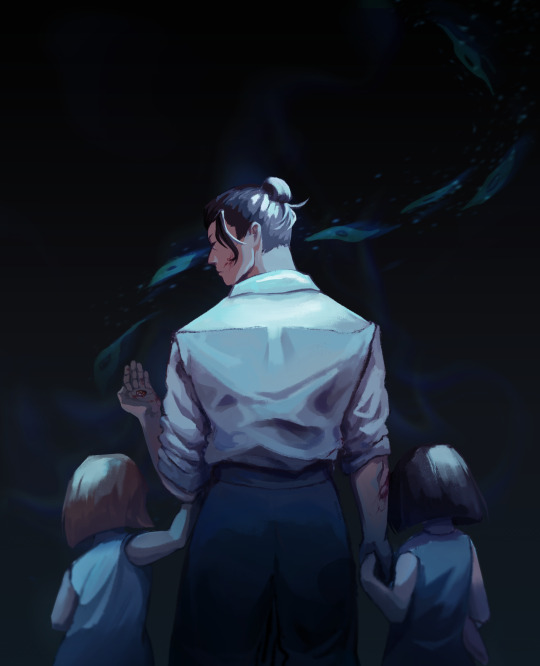
and i am the fire and i am the forest and i am a witness watching it
2K notes
·
View notes
Text
really crazy how much i’ve imagined this fic. like it’s soooooo imagined you wouldn’t even believe. not writing it though
#me power balancing and nuancing my jjk oc until they have more information on their ct than probably any canon character#and then proceeding to have immense brainrot over their lore and backstory#to the point I created an entire fleshed out CLAN for them to be from#and yet I’ve not written a single bit of actual fanfic for them#i’m going insane
44K notes
·
View notes
Text
Fun lil tidbit of the Jjk Akari ending
Shadows are used in JJK to foreshadow the character taking a tragic turn.
Gojo and Shoko are in the light while Suguru talks further into the shadows:

With this logic I like to think some of the small snippets we see say more than meets the eye. Specifically the Facebook poking war:

It opens up with Gojo and Shoko about even in terms of shadow while Suguru has almost half his face covered. It helps more when he has a thousand yard Stare going on. He is someone who is constantly thinking, analyzing, and inside his own head.
That is until Satoru taps him

It's very small but there's a slight shift in the shadow across suguru's face when he feels the tap.

Then Suguru is fully in the light and entirely in the moment to get revenge on Satoru.
Even Shoko shadow lessens once Satoru gets clowned on.
And notice that at no time during this small sequence does Gojo's shadow change levels
someone straight forward and instinctual, living in the moment like Gojo does can uplift the people around him. Especially with a life as tragic and short as a Jujutsu Sorcerer
32 notes
·
View notes
Text
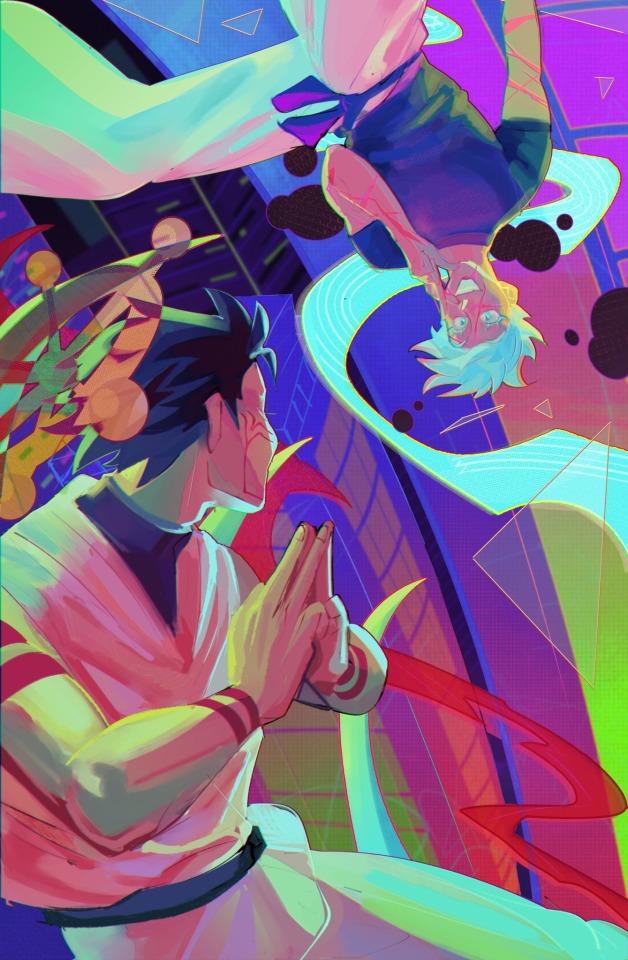
i pull up in that audi you pull up in that honda
2K notes
·
View notes
Text
ok buckle up longform essay on SatoSugu incoming
this thing was written for a friend in google docs and it is six. pages. long
the brainrot is real and it is driving me insane so HERE WE GO
In any interpretation of the relationship between Gojo Satoru and Geto Suguru – lovers, close friends, brothers, etc. – the dynamic and story between them is (at least to me) incredibly tragic.
You have Gojo, who’s the Honored One - born into one of the three most powerful clans with two rare and frankly op techniques that render him a god amongst men and the Strongest sorcerer in jujutsu society - The strongest is untouchable, too high up for anyone else to reach, destined to be lonely at the top and exploited by the rulers of this society as a trump card, a weapon, for the rest of his life
Until he’s not.
Enter Geto - a sorcerer born from non-sorcerers, with the ability to manipulate curses. But his cursed technique is painful, and requires him to swallow the curses he exorcises in order to absorb them; he himself describes the taste as a “rag used to wipe shit and vomit”. If Gojo is a star or the sun he is the earth, closer to the curses they purge from the world than probably anyone else - after all, he ingests them. I’ve seen fics where they describe the curses affecting his mental state, eating him up from the inside and shouting at him in his head - but that’s not canon, and it just makes me sad, so I put it in cause I’m talking about the tragedy anyway. Geto is strong - cracked at martial arts and skillful with his cursed technique, and together he and Gojo are the strongest.
The two strongest sorcerers are tasked with delivering Riko, the star plasma vessel, to Tengen. They grow attached and are very aware that Riko is scared of the merger and wants to stay longer on the earth with her friends and her beloved maid and them, and they indulge her as long as they can before she goes. But they bring her to the school and she dies anyway, by the hands of the urban legend that is Toji Fushiguro - and Gojo, for the first time in his life, comes close to death. Geto, who has never once seen Gojo weak, is in reasonable shock and horror when Toji kills Riko right in front of him, then pronounces his untouchable best friend dead. He fights and is defeated, but not killed, and Toji leaves. Gojo survives with RCT and his new unlocked Hollow Purple, and kills Toji - but when he finds Riko and Suguru steps into the room, he is in a bit of a hollow mental state (which is understandable - riko is dead, he just made what is probably his first kill in his life, and the people who are at least indirectly responsible are clapping and celebrating her fucking death) and asks Suguru if he should kill them. Suguru says no - that there would be no meaning to it, and that meaning is everything - especially to sorcerers. And Satoru follows, because Geto is the moral compass for both of them.
It must be understood that Suguru is a moral person, but in a careful and objective way - he seems to organize things into neat boxes of “right” and “wrong”, “meaningful” and “meaningless”, and holds a strong sense of justice and responsibility that keeps him in the sorcery race even when he has to swallow vomit-curses and watch people die around him. But it grates on him, a lot, and the grieving and vomit and the ignorance of the non-sorcerers he is supposed to be saving, those he once believed were sorcerers’ responsibility to protect against curses, builds up on his psyche like a mold or an infection and keeps growing. When Yuki talks to Geto after the death of Haibara, she plants the idea in his head that yes, cursed energy does come from almost exclusively non-sorcerers and yes, eradicating cursed energy is possible in multiple ways, and yes, eradicating all non-sorcerers is technically a feasible solution, he struggles with that. A lot. At this point he is already spiraling really badly and questioning everything about his morality and his moral compass and his entire life purpose, and takes this idea to heart.
Meanwhile, his near-death and his power evolving during his final fight shook Gojo to his core and pushed him to be stronger no matter the cost. He got good at using his Limitless cursed technique at all times, being able to control it and its branch techniques with great efficiency so that he could never be caught off guard again. He gets sent on more missions, as he truly becomes the strongest - but in this process, he unknowingly begins to leave Geto behind. Gojo works best alone, when nobody is there to become collateral damage for him, and the authorities in charge send him on solo mission after solo mission. He is too blinded by his own pursuit of strength and his perception of Geto - the morally righteous one, his keeper, his compass, his best friend - to see his counterpart dying a little bit more with every passing day he is left to rot in his own mind.
Geto sees this disconnect between him and Gojo and it adds another straw to his very quickly growing spiral haystack, and at some point it has to snap. And it does - he is sent on a solo mission to a rural village, where they have locked two sorcerer girls in a cage and blame them for the things happening to their town. Even after Geto exorcises and swallows the curse that was causing the problems in the first place, the village people blame the girls for their powers. It enrages him, and probably makes him think of Haibara and Gojo and the culmination of all the things non-sorcerers do to sorcerers in the name of ignorance, of hunting and eradicating anything that is “other” or “alien”, of the man who nearly killed him and his best friend and called himself a monkey. How the deaths of his friends have all been undeserved, caused by something they could not control or even foresee, how sorcery is all just a race to the bloody, unjustified, meaningless end. Something in Geto snaps, and he massacres the entire town and takes the girls under his wing with his new conviction: that he hates monkeys, and they deserve to die.
Gojo and Geto have their kfc breakup. Gojo is genuinely shocked that the one person who always caught up with him, and was always there by his side when nobody else ever really could be, turned around and committed mass murder when Gojo didn’t even know Geto was suffering, and Geto takes this as Gojo’s ignorance, too: that while he was here spiraling and rotting to the point that he snapped, Gojo was the strongest. Untouchable. Exalted by all and therefore not knowing, or caring, what it would feel like to doubt his own morality or fear the inevitable death of everyone around him in the brutal world of curses and sorcerers. Geto believes that the life of a sorcerer has no meaning - that the endless race of kill or be killed from adolescence to an early grave is a dead end, a pointless suicide mission, generation after generation of lemmings culled by the sorrows of the weak - by the ones they swear to protect. (Some stories spin it a slightly different way, where Geto and Gojo are in love - and seeing Gojo work himself to the bone to be a living weapon all his life, seeing his one and only isolated like this, kills him more than the thought of being hated for freeing him. They theorize that this is the main conviction that drives him to go through with the plan to kill all non-sorcerers.)
So he leaves, and is branded as a curse user to all of jujutsu society. He is to be killed on sight. But Gojo is the one to confront him, and when he raises his hand to kill his best friend he can’t do it. (“Kill me,” Geto says as he walks away. “There’d be meaning in that, too.”)
The Honored One and the Cursed. The Heavens and the Earth, the Righteous and the Damned. One blessed with innate kindness, and snap moral judgment - one cursed with an infinite moral dilemma, relegated to careful deliberation and action to carry out justice. One with a cursed technique that could be compared to ascension, unlimited power and enhanced perception and untouchable beauty, so high up he is unreachable as heaven itself - one with a cursed technique that could be described as bottom-feeding, damning, so low compared to the veritable God he walks beside that it seems the curses he swallows and the pain he carries could sink him into the earth all the way down to hell.
Yin and Yang, two halves of a whole that circle each other, but never really touch.
Gojo’s Infinity ensures that.
In their separation they both adopt children - Geto the girls he saved from the village, Gojo the kids he saved from the clan that had produced and rejected Toji. Geto becomes a cult leader, amassing curses and money and followers by tolerating “monkeys” and healing their “ailments” and swallowing their curses. Gojo becomes a teacher, swearing that as long as he is there nobody will be alone again. (Shoko was there - has always been there - but that is a different tragedy altogether.)
They meet again in JJK 0. Geto declares war on all of jujutsu society, the Night Parade of a Thousand Demons (I think), and Gojo fights alongside the school. Yuuta and his own tragedy, Rika - his lost childhood love whom he accidentally cursed to remain on this earth and torment him, letting nobody close to her lover - face off against Geto at Jujutsu tech. When Yuuta accepts all of Rika and she fully manifests her power, the strongest curse Geto has ever seen, he begins to fight in earnest. (I’ve heard theories that maybe Geto is so unwilling to accept that Yuuta and Rika are truly in love during that fight because that would mean that him leaving everyone he cared about, and the one he truly loved, in order to save them from a life of suffering was completely unnecessary, and he could have had love and a purpose - he could have had Gojo -without all the pain he caused himself and Gojo and everyone who’d cared about him back.)
Yuuta defeats him. Satoru and Suguru are left alone after everyone has left, one painfully mortal and one painfully untouchable. Destined to fight each other. One cursed to die, one cursed to live. No matter the dynamic that was between them, their last words are a tender moment and a testament to the affection and care they still hold for each other, even after their ideals and their lives have strayed so far from each other in adulthood. Gojo kills Geto, but does not have the heart to dispose of his best friend’s body - which is what relegates Geto to the role of puppet, used to carry out Kanjaku’s agenda. In a way Gojo really did curse him, in the end.
Breaking the fourth wall, there are little elements outside the story that make it so painful as well.
Gege Akutami, the mangaka who created this whole universe and its characters and their dynamics (I look up to him, kinda, for the pain he makes me feel) has given details in author’s notes and interviews that make SatoSugu all the more painful. For starters, he agreed with the producer’s(?) statement, which describes Geto as Gojo’s “first and last warm spring of youth” which,, ow; and then he makes it so Geto’s priestly cult man robes are a design that literally have part of Gojo’s name in it (I can’t find the actual name but it’s in there) and in one author’s note or filler issue of the jump he gives us songs that remind him of each character and one of Gojo’s is about heartbreak and love and LITERALLY WORD FOR WORD could describe the dynamic between the two.
BUT THAT’S NOT ALL!!
The anime, in season 2, opens with Ao no Sumika and ends with Akari - I think the opening and ending are meant to be Gojo’s perspective and Geto’s, respectively. The lyrics line up - the opening is fun and lively and bright but still foreshadows pain and heartbreak in the lyrics and certain frames of the sequence, and the ending is vaguely melancholy in lyrics, melody, and color; it’s even raining, and half the time Geto appears on the screen he is doused in shadow. In the opening the singer literally reflects on how the brightness/loudness of being with this person drowned out their silence (which cmon that’s satosugu for certain), and ruminates on the unsaid “will we meet again?” between singer and subject. (which AGAIN, SATOSUGU) And one of my favorite ever sequences in that ending sequence is a pair of scenes that show first Gojo, his eyes following a black beta fish with spiky, damaged fins and tail; and then Geto, his eyes downcast, looking away from a white beta fish that is whole and healthy, almost glowing. It’s my favorite way their dynamic is symbolized in the anime and the most painful - just these two frames themselves are enough to foreshadow their entire story. Gojo cares about Geto, and follows him - he wants him to come back. He wants him to be by his side again, for them to be the strongest again. But he doesn’t even notice Geto’s departure until the fish is already on its way off the screen. The fins on the black beta fish are damaged because Geto is sick, because Geto is spiraling, because beta fish whose fins are damaged and sickly like that are typically not far off from dying. Geto looks away from the healthy white beta fish - he turns his back on love. He thinks it’s pointless, and accepts like a martyr that to save Gojo from his fate at the hands of this world he will have to hurt him by destroying it, and likely dying because of it. What’s more - two male beta fish can’t be in the same tank together. They’ll fight to the death until only the strongest is left.
Gojo and Geto are tragic because it’s so clear that Gege wrote them as a duo, two halves of a whole, two sides of a coin. They are foils as much as they are literally meant for each other in any way that phrase can be interpreted, and yet they are destined to fall apart in the end. One is destined to kill the other, then live with the grief that comes from it. The strongest is fated to survive at the cost of the other, stranded on a pedestal that is covered in blood. They are kids, thrust into an endless cycle of death and pain and suffering and gore because it is their responsibility to protect the people that cannot help themselves, and when the two strongest children are met with the horror of it all one breaks and drops out, and one continues the race and runs faster because he’s not allowed to drop out. The one still running eventually must kill the other to keep running. The best tragedies are those where the characters could have very easily done something to prevent the tragedy from happening or stop it as it unfolds – but because of who they are, and their inevitable choices because of who they are, it doesn’t make sense for them to do so. It makes sense that someone so morally compromised like Geto would snap at the realization that the deaths of his friends will keep happening. It makes sense that once the idea was planted in his head and he was shown the multitude of ways in which non-sorcerers were ignorant of the suffering sorcerers went through to protect them, he snapped at the sight of child sorcerers being relegated to a fate they didn’t deserve. It makes sense that Gojo would let Geto free out of love, even if it led to his demise anyway. It makes sense that he was so shocked at his friend’s actions and curse-user status, because he was buried in his own set of societal pressures and took his friend for granted. It all makes sense, and yet they’re all doomed. Every last person in JJK is doomed. Geto’s children died trying to free his corpse from the monster (man) that stole it. Both of Gojo’s children house(d) ancient sorcerers, and will both probably die fighting in bodies they cannot control. Yuji, the main character, is surrounded by the deaths of everyone he cares for, and the foreshadowing of his own inevitable end. Gojo is the Prince in his tower, is forced to watch, untouchable, trapped, as the knight on a dragon is shot down, plummets to the earth below - and becomes the enemy against his own will. Sometimes it makes me so sad I am close to tears. (and sometimes i read fics that make me cry more, because how in the hell are people that good at writing grief and angst and tragedy and where can I learn to do the same)
If the manga ends happily I’ll be surprised, because right now it seems a tragic but meaningful ending is in the works and I’m scared
#jujutsu kaisen#jjk spoilers#satosugu#stsg#geto suguru#gojo satoru#can you tell i'm a huge sucker for fated tragedies#im losing my mind#i went off memory apologies if anything is wrong
17 notes
·
View notes
Text
jjk s2 ending brainrot
the jjk s2 ending for the hidden inventory arc is filled with beautiful symbolism. i've been thinking about this so much and i just wanted to get it all down. workers at mappa clearly thought it out and how they wanted everyone to leave each episode. note that i definitely don't have everything all down in this post. i'm not that attentive, so if you have anything else you noticed please let me know.
tl:dr an overwhelming amount of satosugu brainrot filled with betta fishes, water, and pain
NOTE: THERE WILL BE SPOILERS FOR SHIBUYA ARC AND FURTHER. IF YOU ARE AN ANIME ONLY DO NOT READ THIS.
-----
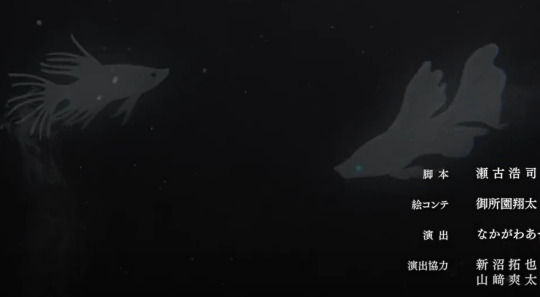
OBVIOULSY i have to talk about the betta fish. i'm gonna go on a pretty long tangent so bare with me but i used to have 4 betta fishes, o, a, p, and e and they all lived in the same tank (it was my first time owning fish). a died of natural causes, p got swallowed whole by o, and e got decapitated by o. if you put betta fishes in a tank together, they will fight it out till the one that is the strongest survives. other than the eyes of the fishes ofc we can also determine which one is the strongest based on the state of their fins. an indication that a betta fish is unhealthy is through their fins. if they are slightly stringy (unless they're a specific kind of betta fish) it is a sign that they're not healthy. sometimes the health issue could come through malnutrition or fighting between betta fishes. we can now further deduce that because geto is the less healthy betta fish, gojo is naturally the strongest of the duo (thus the end of the strongest duo...) another thing to note, by using betta fishes to describe gojo and geto LITERALLY it means that in no world can those two ever be together. they will always fight and one will always emerge victorious while the other will frankly die. they're not fated to be together but rather they're fated to be each others natural enemy.
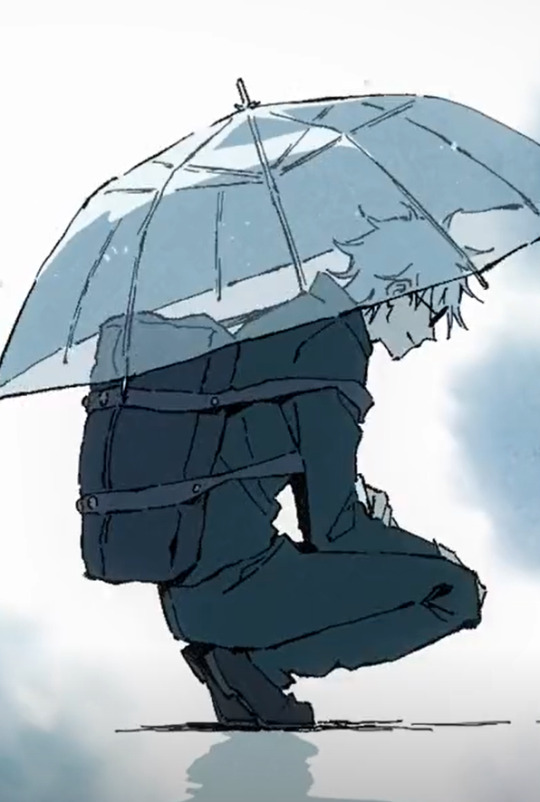

this is a little bit of a stretch and something that kinda makes zero sense at all but stay with me for now. water in jjk openings and jjk endings is typically used to indicate danger. think sukunas finger literally growing plants out of water and sukuna (no offense to sukunas stans) kinda is just danger all around. through each opening and ending we get to see how each character interacts with danger through the way they interact with water. satosugu is no exception to this. gojo is protected by the water with an umbrella, something he most likely brought with him because he knew it was gonna rain. a couple of things about this are that gojos technique obviously protects him from danger. as long as the technique is activated and he's using reverse cursed technique to unfry his brain, he knows that he will not get hit and it's very hard to actually get him into a dangerous position. the nature of his technique protects him and distances himself away from the danger of curses and whatnot. geto however only has his school bag protecting him and he's obviously going to get wet there is no denying that. even if the schoolbag managed to cover his entire body, his hands would still get wet. getos technique unfortunately is just not as powerful as gojos and can't protect him as well. i am not saying getos technique isn't powerful there's a reason why he's a special grade sorcerer. i'm just repeating what is established in the story and that is geto is simply not as powerful as gojo thus is more susceptible to danger. additionally, the nature of geto's technique quite literally exposes him to danger. he has to literally absorb curses by making them into spheres and using his hands to swallow them. HE IS CONSTANTLY INTERACTING WITH DANGER IN ORDER TO FIGHT AND SURVIVE, which is why he will never be fully protected by it unlike gojo whose technique distances himself away from these curses. geto has to as his technique draws himself closer to these curses. it's the only way he can fight, something he learned a lot from school which is why he is using his schoolbag to protect himself from the rain
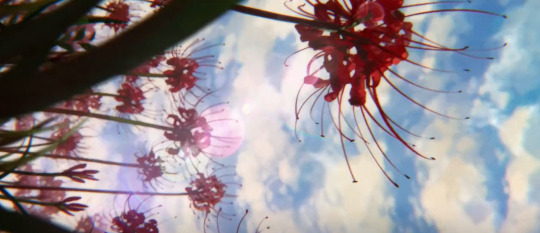
this section is going to be shorter than the rest BUT theres this beautiful section of the ending dedicated to these red spider lillies. if you watch a lot of anime you probably already know what these symbolize but they symbolize death and rebirth. pretty obvious as to how it connects to satosugu but this one article i read specifically said that these flowers could also represent the separation of lovers. pretty interesting to think about isn't it? (gege i'm gonna catch you one day just so satosugu can finally live a happy life)
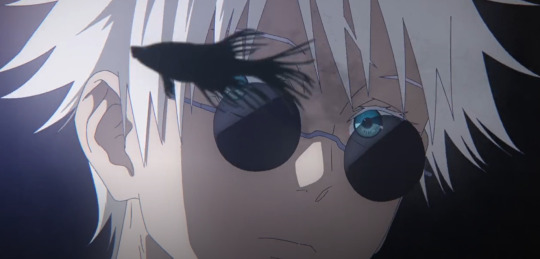
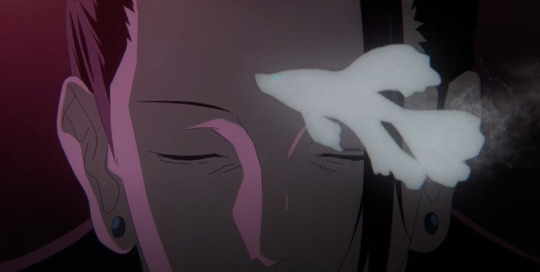
THE BETTA FISHES ARE BACK WOOO. anyways, in the scene with gojo, getofish floats by and gojo doesn't actually fully notice it until its gone. and off the screen.
which is LITERALLY WHAT HAPPENED IN THE STORY.
gojo didn't notice geto's struggle until it was too late. by the time gojo noticed geto had already finished his little mass murdering of the village and he had already decided what he wanted to do. also important to note, gojo follows the fish and continues to stare the second he notices (you guys remember how gojo immediately noticed geto's residuals after 10 years. yeah. me too.) in geto's scene, gojofish floats by all healthy and geto actually immediately notices the fish and immediately avoids eye contact with the fish. geto's pretty naturally attentive. you can actually notice him all throughout the season just quietly staring at gojo. and much like the ending of their friendship, geto can't face gojo directly. i'm not necessarily calling him a wimp?? but like he did the kfc breakup in front of so many people. he's not really talking to gojo directly, more like talking very loudly over others and speaking in identity crisis riddles. i have more thoughts on this but they keep coming out onto the post not the right way i think the fact that geto can't look at gojofish directly has something to do with the fact that geto was the morality check that gojo needed and because of geto's new "mindest" (because i'm a firm believer that geto's morality still remains the same. he is still a very caring individual just he really can't stand non-sorcerers and might be protecting them in his own very fucked-up way) the morality that gojo initially thought was correct kinda just crumbled. but i can't actually formulate a reason for this morality check because it's just a bunch of jumbled thoughts in my brain.
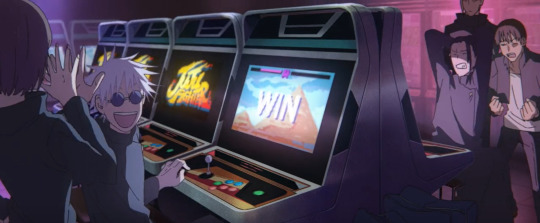
SPOILERS FOR SHIBUYA ARC
arcade games really make their way into these don't they. a lot of people have noticed this so i'll keep this brief. the people on the winning side are gojo and shoko, the only people currently alive from the students we're introduced to in hidden inventory. the people on the losing side are geto, haibara, and nanami, all of which are currently dead. something else i noticed is that it's directly gojo and geto that are versing each other in the arcade game and it's rather sad because technically in the end gojo did "win" against geto.
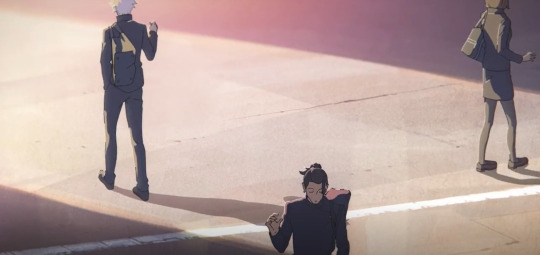
a lot of people have also talked about this so i just want to add my two cents. obviously gojo and shoko are in the light and geto is in the dark, symbolizing the contrasting sides they've taken. but i wanted to specifically talk about this white line. let's just say this white line is the clear shift in what gojo called getos "moral argument". geto is completely past this line and he has rejected his past ideals and shifted his ideals to match his new understanding of the world. gojo is walking away from this line. he was previously on this line, and didnt' understand what geto's "moral argument" was before. now he fully understands and is talking steps to maintain this moral argument. sure he also wants to change the world to be better and where curses are slightly less prevalent, but he's doing it through education and still willing to protect non-sorcerers. shoko is also past the line but she is walking parallel to it. in my opinion, shoko was far more relaxed when she heard about what geto had done and even joked around with him a little bit when they ran into each other. she still has an understanding of geto's previous "moral argument" but she's not necessarily taking any deliberate action to further this argument. she just understands it and isn't rejecting it. do not get me wrong though, she has a very important role in the jujustu world it's just very different from the motivations of gojo who is furthering said moral argument (this is like very messy and i know it probably makes no fucking sense at all)
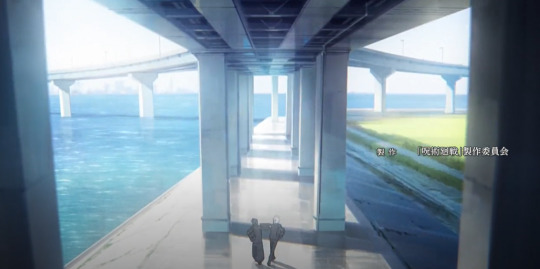
FINAL ONE and it's probably gonna be pretty long. once again this is talked about a lot so i'll keep the first part sort of brief. irl this bridge only has one road but for the sake of the story, mappa made it two. gojos path leads to land (safety) and geto's path leads to danger (water) (IT'S ALL COMING BACK TOGETHER). what i wanted to talk about was the animation that occurs in this scene. a couple of things happen
1. gojo crosses over to geto's half of the screen
2. geto pushes him back
3. gojo remains on his half for the rest of the scene
gojo would've crossed over to geto's side when he was carrying riko's body if geto just said yeah i'd like to kill those fucking annoying people cheering on the death of a literal teenager because i want my god to become something akin to a tree. gojo would've literally obliterated them and probably wouldn't have thought too too much about it as geto was literally his moral guide. at that time whatever geto thought of as moral, gojo kinda just went along with it (he did argue about it ofc, it's gojo). geto however pushes him and says no there's not really a point to kiling them and so gojo remains on this set moral path for literally the rest of his life. in my personal opinion, gojo remains set on this path because riko meant a lot to geto and gojo and for geto to say there's no point in killing them even though the organization was so cruel for no reason, then this argument obviously becomes incredibly compelling. this also could explain why gojo couldn't find the point in geto's mass murder of the village
-----
those are all my thoughts that i really wanted to get down. please let me know if theres anything else that is in this ending that will cause me to sob i am all ears. satosugu actually has ruined my life so a little more probably won't hurt (it will)
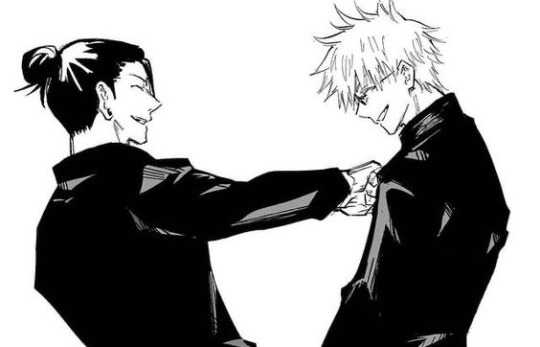
#what if that was my last straw#im gonna fucking cry#it’s explained SO WELL#geto uses martial arts which is his HANDS which are the danger and it’s so. AGHH
22 notes
·
View notes
Text
ow
earlier in the episode/chapter we hear toji explain satoru’s technique. to put it plainly: blue=pulls in, red=repels. taking that into account, it seems to me like this scene perfectly captures the way suguru and satoru cope with their loss of innocence
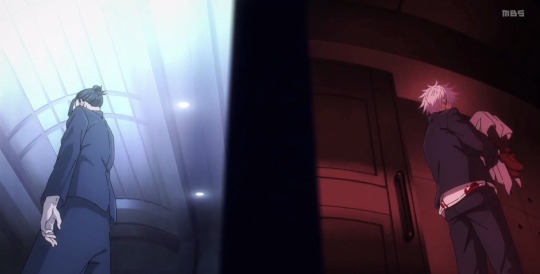
suguru begins to internalize arising problems to the point that they eat away at him from the inside, while satoru strongly fixates on creating a distance between himself and the world. it’s all very smart storytelling from the animators
6K notes
·
View notes
Text
AAAA THE COLORING THE SYMBOLISM THE WAY GETO IS ON THE EAST AND LIGHT SIDE WITH GOJO ANDTHEN HES FACING WEST AND DARK WITH THE VILLAGE ITS ALL SO WELL DONEEE
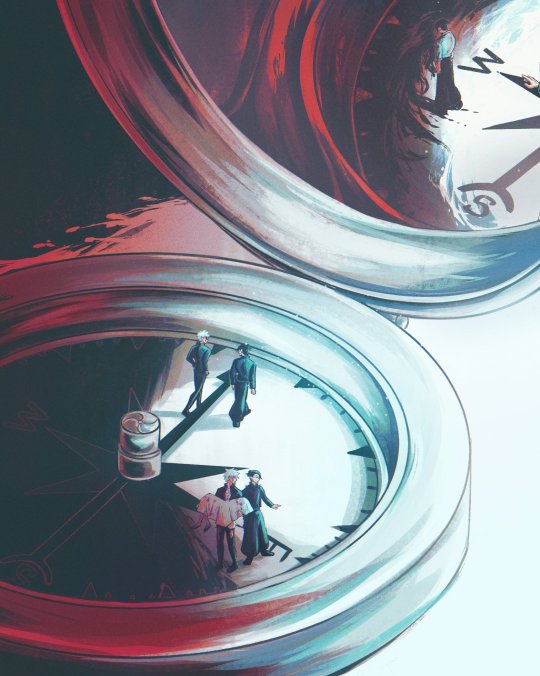
Moral compass
5K notes
·
View notes


